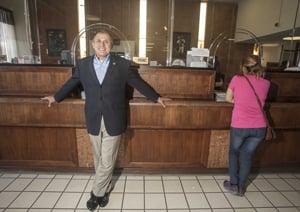
Take a working-class immigrant without citizenship papers, without a credit score, without much cash in the bank – maybe without a bank account at all.
Now offer him a loan to cover the cost of becoming a U.S. citizen, a loan that’s secured by nothing but a promise to repay. Sounds like too risky a proposition for all but the loan sharks.
But Jesse Torres is a banker, not a leg breaker, and he says his Pan American Bank in East Los Angeles is making money by offering loans to precisely that kind of borrower.
For nearly a year, Pan American has offered $1,000 loans to green-card holders to cover the cost of applying for citizenship. Though borrowers are mostly poor and have little credit history, the citizenship loans are among the most solid on Pan American’s books.
So far, only one of 150 borrowers has been late with a payment.
“And that fellow came in and remedied that right away,” said Torres, Pan American’s chief executive. “The entire portfolio is up to date.”
But the bank isn’t lending to just anyone. Only about 30 percent of applicants qualify. That selectivity – along with an interest rate of 12 percent – means Pan American is actually making money on these loans.
Citizenship application loans have been around for years, but they’re usually offered by non-profit groups or credit unions, often with the help of grant money. Pan American is one of just a few for-profit institutions – and the only one in California – to offer such loans. Torres said profitability is key to making the loan program sustainable, as grant-funded programs tend to shrink as funds dwindle.
The West Adams non-profit organization National Association of Latino Elected and Appointed Officials Educational Fund, or Naleo, used to offer no-interest loans that covered 60 percent of the citizenship application fee. But the group stopped issuing loans because of the time and resources it took to underwrite them, said Elisa Sequeira, the fund’s director of civic engagement for California.
“We didn’t have the expertise,” Sequeira said. “We weren’t that efficient. It took a significant amount of work to manage that service.”
What’s more, non-profits may not have the desire or ability to collect from delinquent borrowers. In one case, Torres said, a non-profit set up a $1 million citizenship loan fund, but only collected 85 percent of what it loaned.
Banks, Torres said, can’t let that much money slip away.
“If these groups could just let banks do what they do best, their constituents would be better served,” he said. “It has to be sustainable, or it’s here today and gone tomorrow.”
‘Not enough left’
Manuel Paxtor, 49, lives in South Los Angeles and works as a nursing assistant in Sylmar. He makes about $20,000 a year.
He has a green card and has been eligible to apply for citizenship for about three years, but he hasn’t been able to save up enough cash to pay for the process. U.S. Citizenship and Immigration Services charges $680 for a naturalization application, and non-profit groups that help immigrants fill out required forms often charge a few hundred dollars.
“I sometimes think I’ll have the money this month or the next month,” Paxtor said. “But I pay for my house, I pay my bills, I pay everything and there’s not enough left.”
In May, he applied for a citizenship loan from Pan American. After reviewing pay stubs and bank statements, the bank approved the loan. Pan American sent $320 to Paxtor, most of which he paid to a non-profit to help with his application. Once the application was ready, the bank sent $680 to the citizenship agency.
Paxtor pays about $65 to the bank each month. After 18 months he’ll have paid off the loan and about $103 in interest, plus a $50 application fee. Borrowers usually opt to add the fee to the loan amount rather than pay it up front.
Pan American also offers a 12-month loan with monthly payments of $93 and a 24-month loan with payments of $49. With the longest term, a borrower will ultimately pay $136 in interest, plus the application fee.
Though there is no shortage of potential customers for citizenship loans, with an estimated 2.5 million legal permanent residents in California who are eligible for citizenship, it will be difficult for Pan American to reach that many borrowers.
Though Torres said the loans more than cover the bank’s costs, the margins are thin and the loans don’t generate enough profit to justify spending money on advertising. That leaves the bank dependent on Naleo and other non-profits to refer borrowers to the bank.
Still, Torres said the loans make good business sense. Pan American is one of several local banks that get federal grants for lending in poor and minority communities. And along with earning credit for those grants, Torres said the loans are a marketing tool.
He hopes immigrants who become citizens will prosper, start businesses and, eventually, come back to Pan American for a small business loan.
“It’s the right thing to do, and it fits with our mission, but it also makes sense because it will allow us to grow our business as they grow themselves,” he said.
“Immigrants are very entrepreneurial. We’re looking to use this as a product that introduces them to us.”
